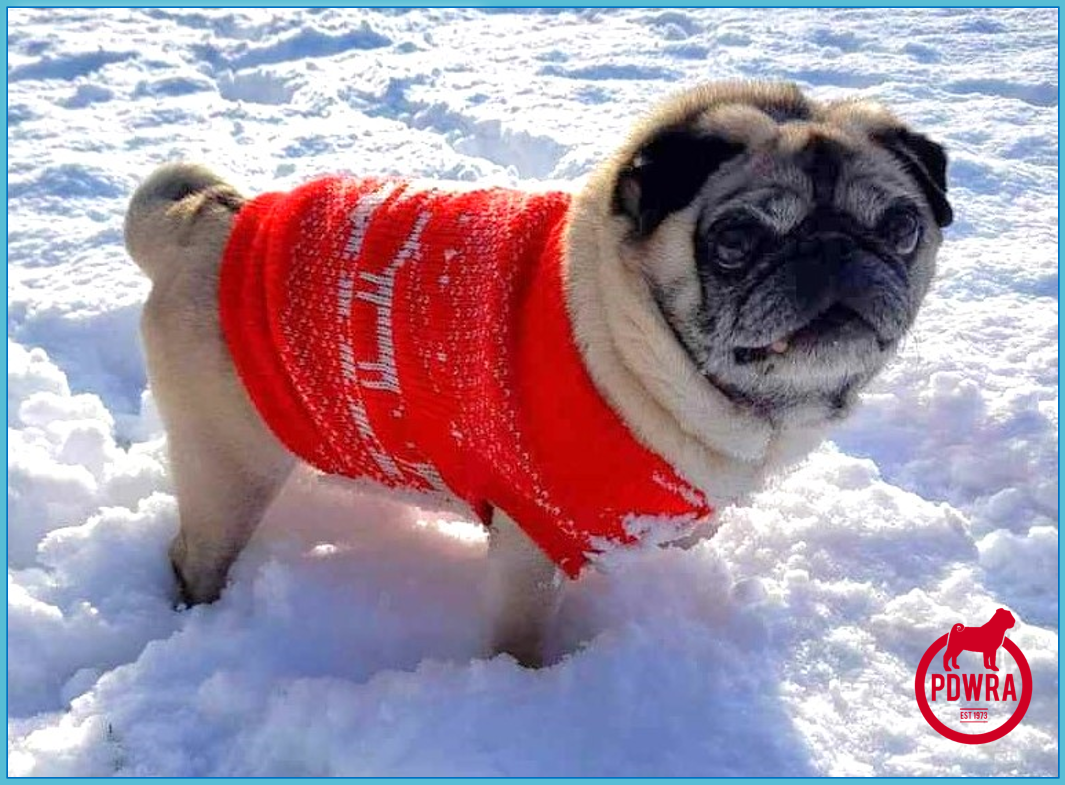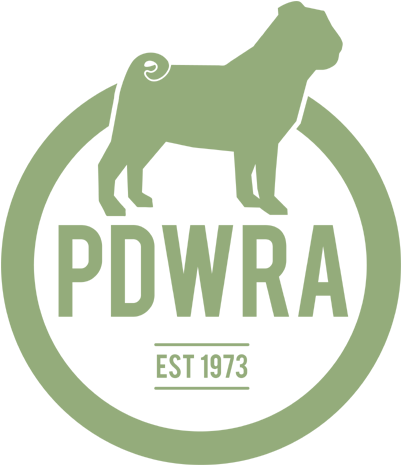by Yasmin | 2 Feb, 2024 | Blog, Rescue Stories, Fundraising
This is adopter, Shirley’s, drawing of Daphne, who we appealed for a home for, last September. By October they were inseparable!
Shirley is an extremely talented artist also, and has been raising money for other dog breed charities, raising over £10,000 just by drawing people’s dogs. She has now offered her talent to raise funds for PDWRA!
In January alone, Shirley graciously donated a remarkable * £135 * from the sales of eight distinctive and original drawings so we are sending a heartfelt thank you to Shirley for her incredible contribution!
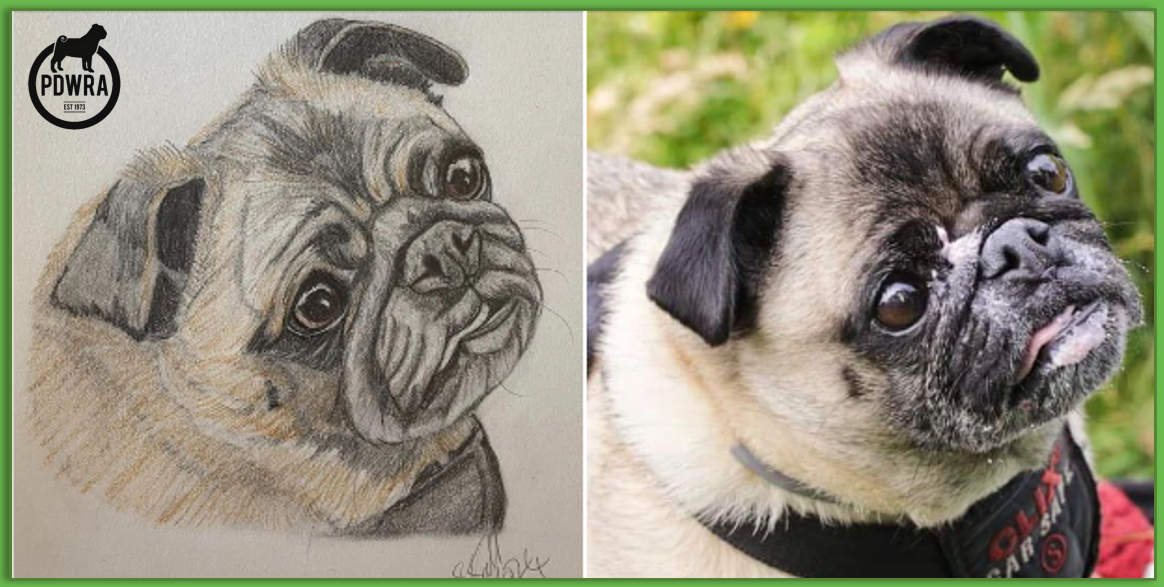
Our pug owners are absolutely delighted to own such personalised artwork featuring their beloved furry companions!
Shirley will draw anything with four legs! 😄
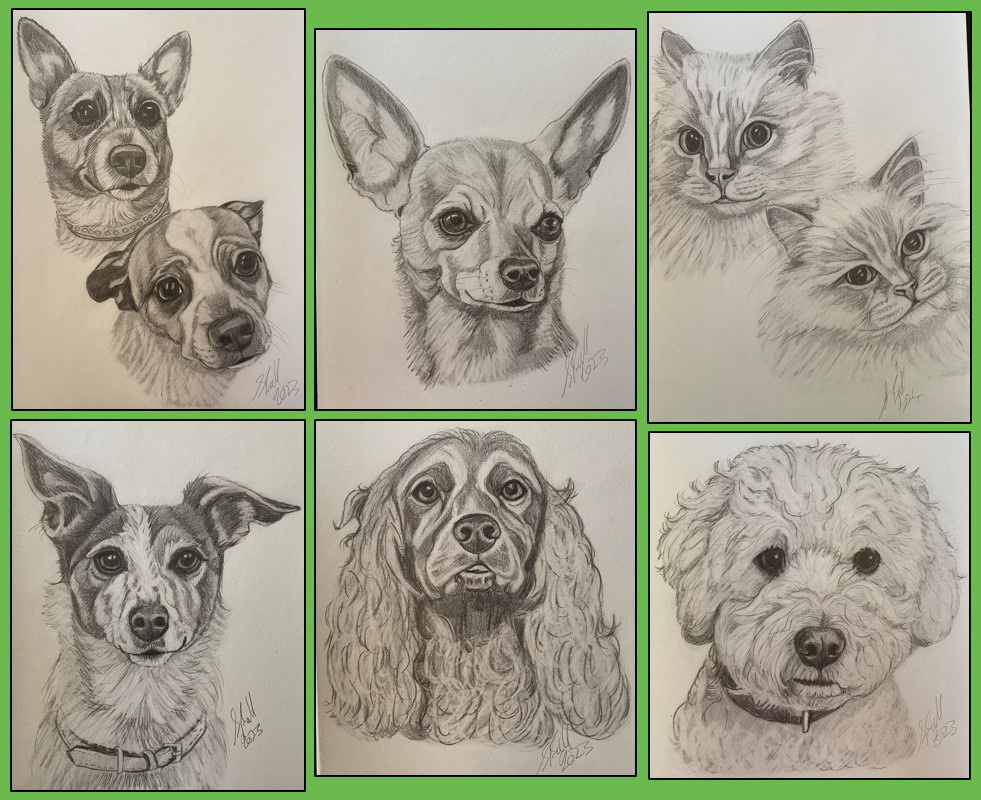
So, if you’re interested in supporting the PDWRA and acquiring these unique personal drawings don’t miss the chance to make a difference with your purchase. Please join our Mega-Auction fundraising facebook group to find out more:
PDWRA Mega Auction For Pugs In Need | Facebook
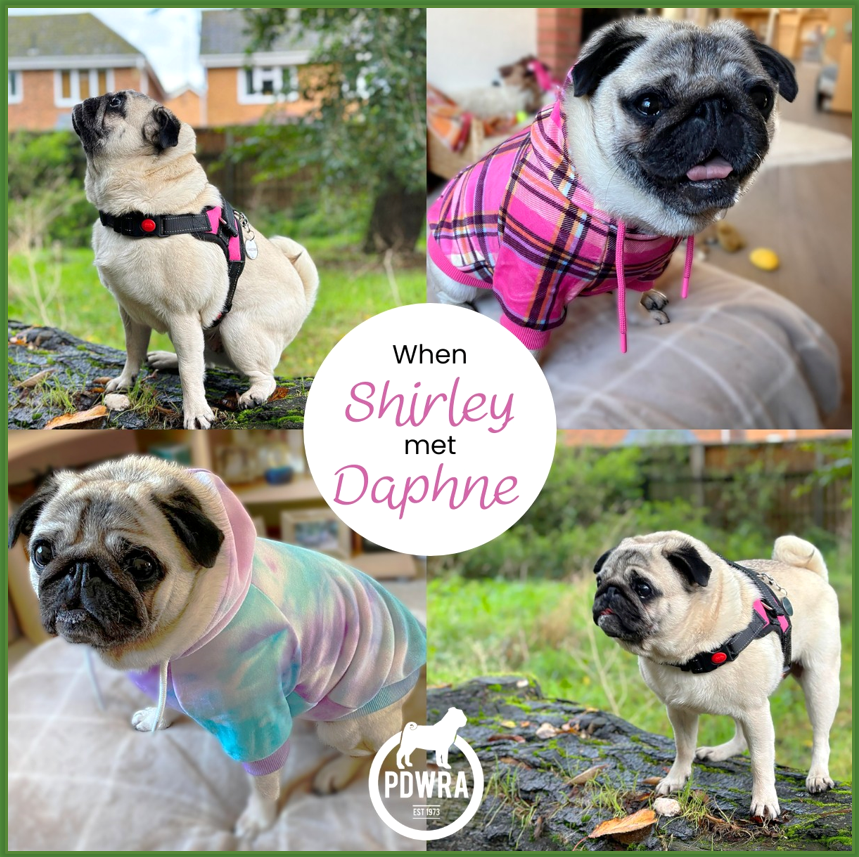
Here are links to their Happy-Ever-Story!:
When Shirley met Daphne! | The Pug Dog Welfare & Rescue Association (pugwelfare-rescue.org.uk)
Daphne, adopted & completely at home! | The Pug Dog Welfare & Rescue Association (pugwelfare-rescue.org.uk)
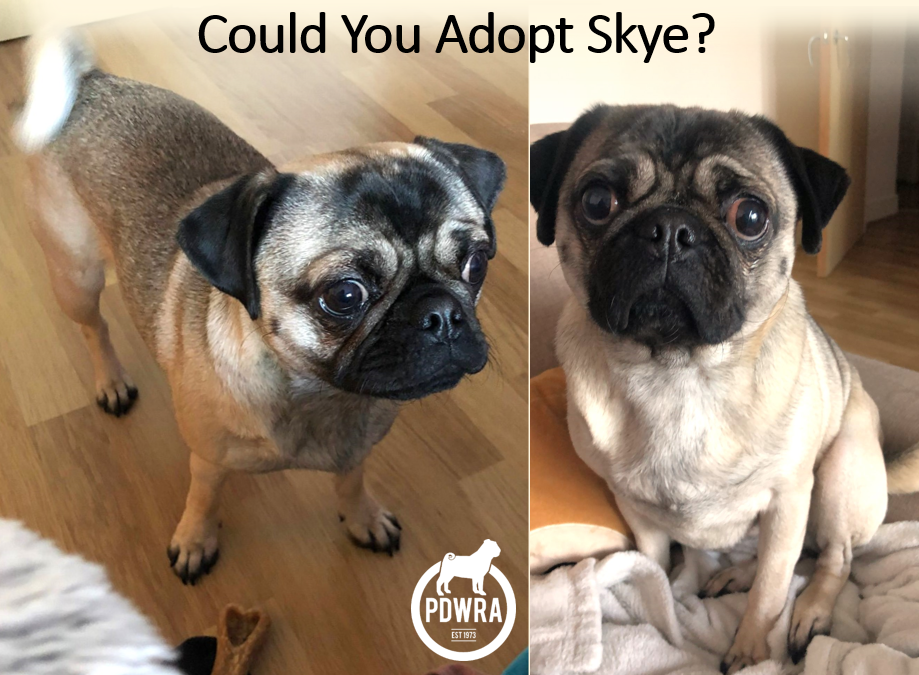
by Yasmin | 27 Jan, 2024 | Blog, News, Rescue Stories
** GOOD NEWS UPDATE, Feb’24: Skye has found her Forever-Home and is settling in well! **
COULD YOU ADOPT SKYE?
Skye is the sweetest, most delightful young pug who unfortunately has been kept in a flat, never walked outside or properly socialised.
She really needs an experienced adopter, willing to invest in helping her to understand the world outside especially, and enjoy her life the way she’s only just starting to!
Skye’s fosterer of a few months, says she has no social skills outdoors so barks at every dog and human she sees. She can be encouraged to relax but only for a short spell and will start barking again. She is simply nervous and doesn’t understand normal social cues.
Skye is neutered and has lived with older children, and a cat, and currently in foster, is living with a female pug of a steady nature. She is fully housetrained and used to be crated with toys to sleep.
Skye does love being outdoors though, for good long walks or chasing a ball which she’d do for hours, also acts as a good distraction technique when people are nearby.
She’s very fit and a destroyer of toys, and can be quite growly in her play. She has a good appetite and now sleeps along with her fosterers pug at the foot of the bed.
It takes Skye a while to settle down and feel comfortable with visitors who stay over, so short-term visitors will be barked at a lot! She can growl at people if they are doing something she does not like with her, although she has not nipped at all, however, young children would not be recommended to be resident in the home.
Skye is a lovely, sweet little soul who’s funny and an absolute delight, who enjoys her cuddles and toys. She isn’t a dominant but has a big personality!
So, if you, or anyone you know, could offer this lifeline to Skye, reaping all the rewards pug-owners are so familiar with, please contact your local PDWRA VAC to discuss further if you are already registered with us,
or apply here, referencing Skye 23214 : Adoption | The Pug Dog Welfare & Rescue Association (pugwelfare-rescue.org.uk)
Thank You! 💝🐾
******
For other Rescue Stories, and Appeals for Homes, please see: https://pugwelfare-rescue.org.uk/category/rescue-stories/
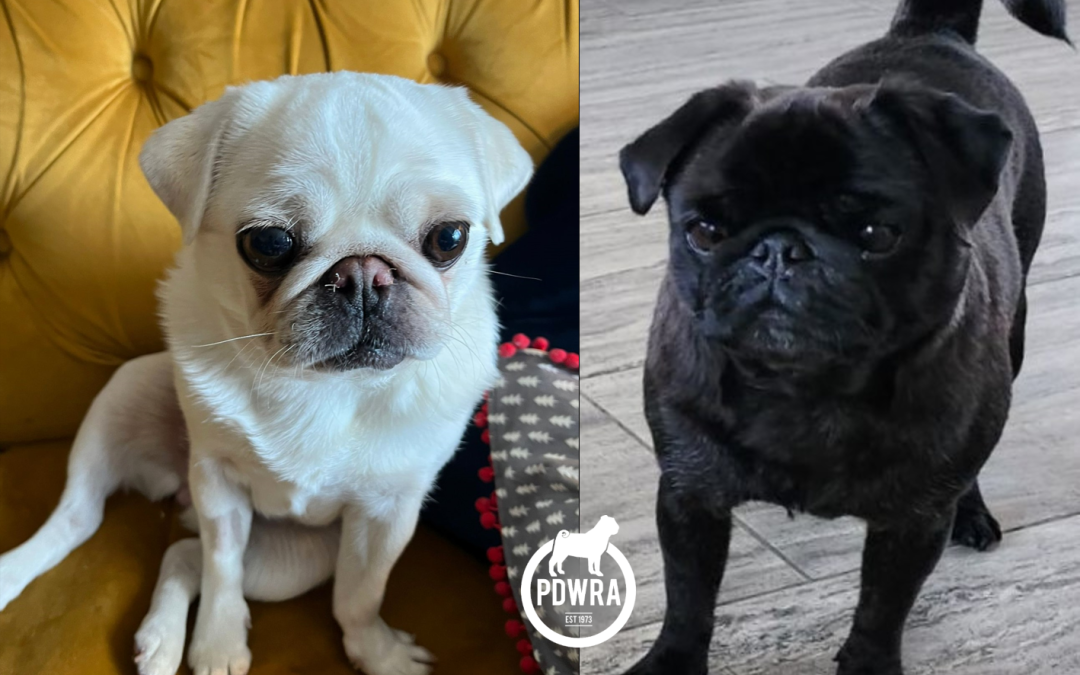
by Yasmin | 22 Jan, 2024 | Blog, News, Rescue Stories
** GREAT NEWS UPDATE – by Feb’24 Rosie & Pepper are settling into their Forever-Home! **
Rosie & Pepper are Adopted! | The Pug Dog Welfare & Rescue Association (pugwelfare-rescue.org.uk)
COULD YOU ADOPT ROSIE & MUM, PEPPER?
This is 4 year-old Rosie (white) and her Mum, Pepper (black) who is 6 years-old. They are looking for their Forever Home together.
They have been very well cared for and lived with children of various ages as well as other dogs, though are untested with cats.
They are very bonded and Dad was a panda pug hence their respective colouring. Rosie relies on her Mum, often looking for reassurance from her and will search for her when she’s not around. They are fed separately though, as Pepper can dominate & take young Rosie’s food.
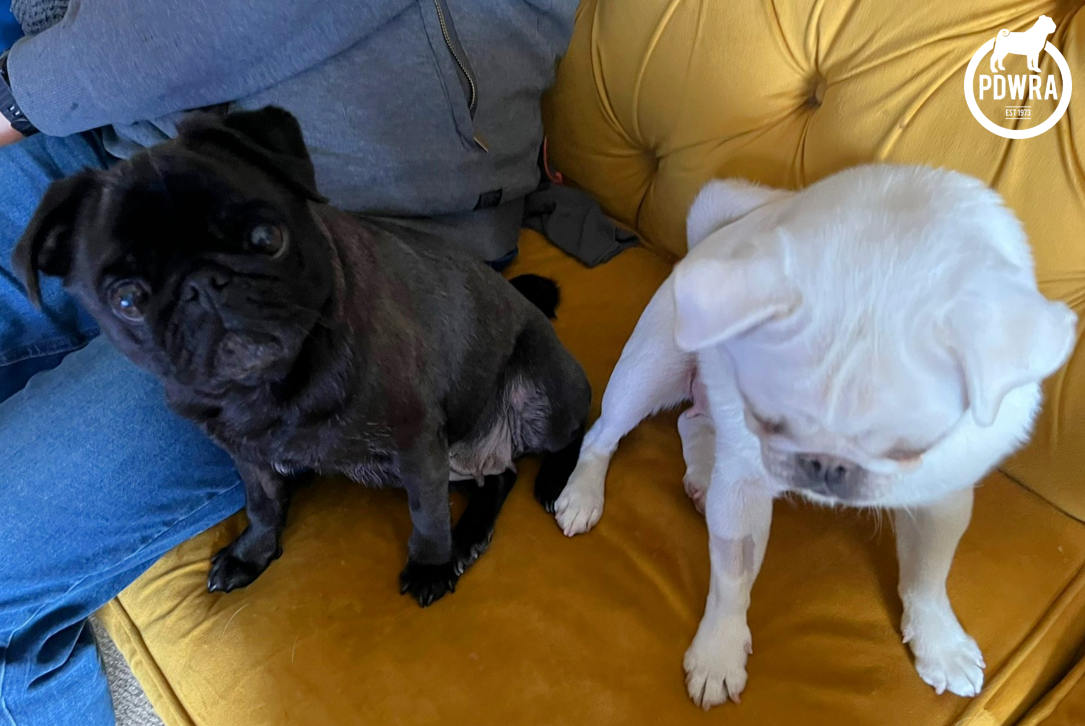
Both gorgeous girls have been spayed, Rosie has also had BOAS surgery- now well-recovered and very healthy.
They enjoy their walks and are great off lead, with good recall. Equally they love quiet time on the sofa too. They love cuddles and kisses and are playful, happy-go-lucky pugs. Both are incredibly loveable and sweet natured and would bring a lot of joy to their new home.

Could you offer Pepper and daughter, Rosie, their forever home together?
Please apply, quoting Reference: Pepper 23220 & Rosie 23219 at: https://pugwelfare-rescue.org.uk/adopting-a-pug/
If you are already registered with us to adopt, please speak to your PDWRA Area Coordinator directly.
Thank You!
Rescue Stories | The Pug Dog Welfare & Rescue Association (pugwelfare-rescue.org.uk)
Blog | The Pug Dog Welfare & Rescue Association (pugwelfare-rescue.org.uk)
by Yasmin | 21 Jan, 2024 | Blog, News, Pug Health
With the low temperatures last week did your pugs get a chance to have fun in the snow, like Margo & Alfie? or did they prefer to stay warm & toasty indoors?
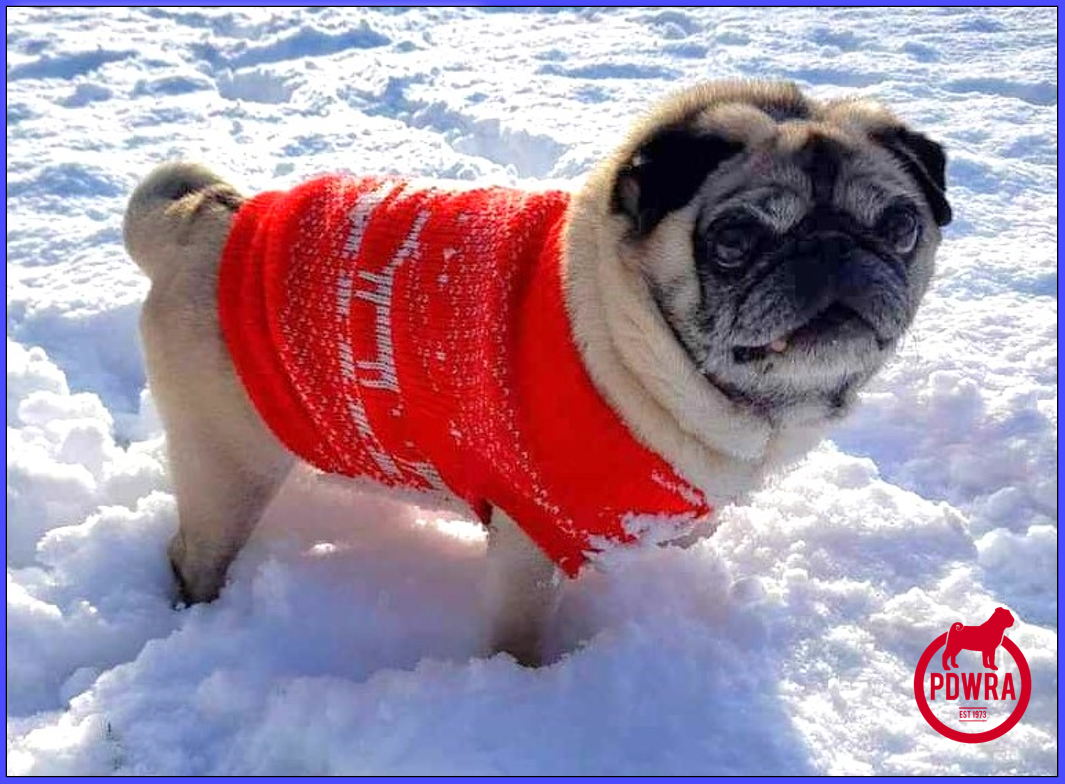
The latter would be recommended now Storm Isha is on its way….. with strong winds and heavy rain affecting nearly the whole country. More severe near coastlines.
Storm Tips:
- Be alerted to local weather warnings, news & reports.
- Ensure microchips are up-to-date and use ID tags with your contact number in case they get loose.
- Keep them away from floodwater which is dirty as well as containing floating or hidden objects.
- Secure your home and make it cosy as you would when there are fireworks. Make a den if it helps.
- It may be worth preparing an emergency kit of pet supplies & medication in case you need to evacuate quickly. Notes on pets with regular medications is always useful in case you need help from others.
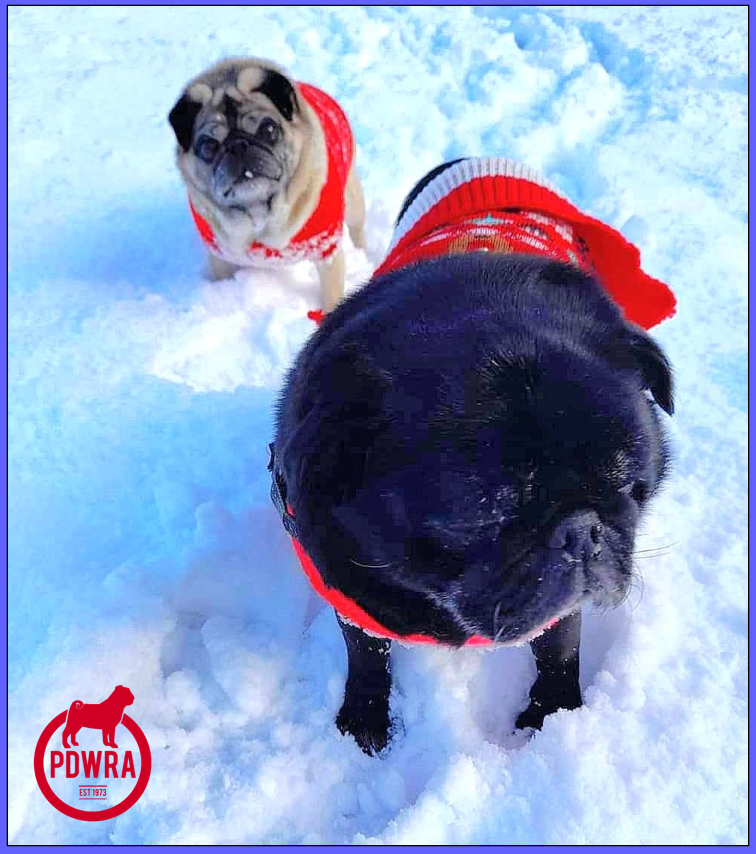
Please see further tips & advice for pug safety in winter conditions:
https://www.pdsa.org.uk/what-we-do/blog/keeping-pets-safe-in-stormy-weather?
The Big Chill is Here! | The Pug Dog Welfare & Rescue Association (pugwelfare-rescue.org.uk)
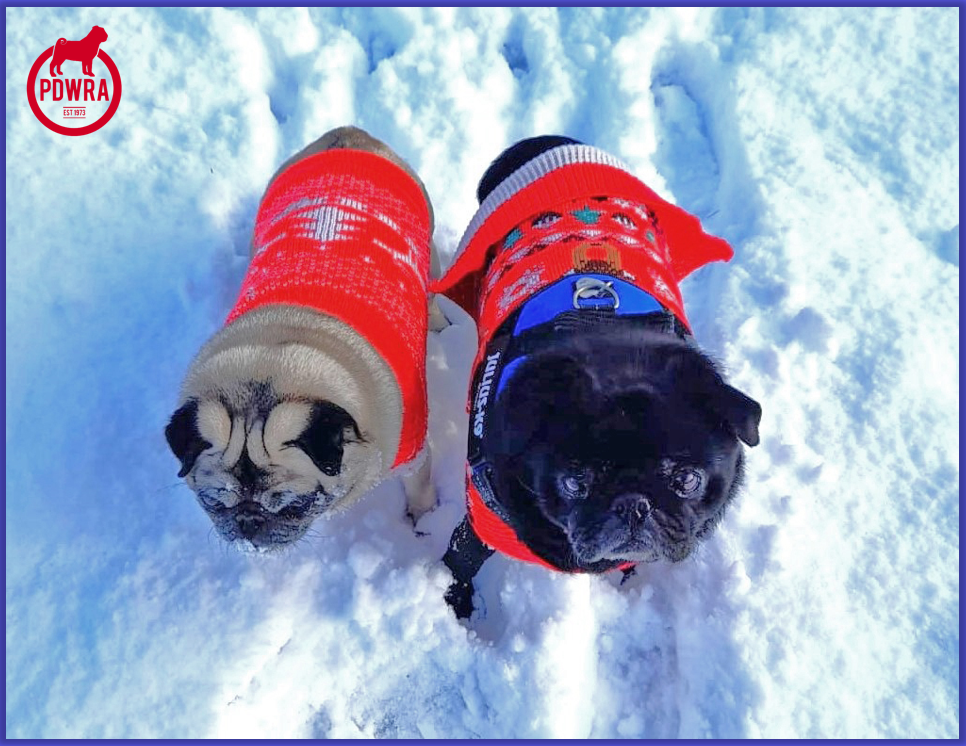
https://www.thekennelclub.org.uk/health-and-dog-care/health/health-and-care/a-z-of-health-and-care-issues/winter-dangers-to-dogs
by Yasmin | 16 Jan, 2024 | Blog, News, Pug Health
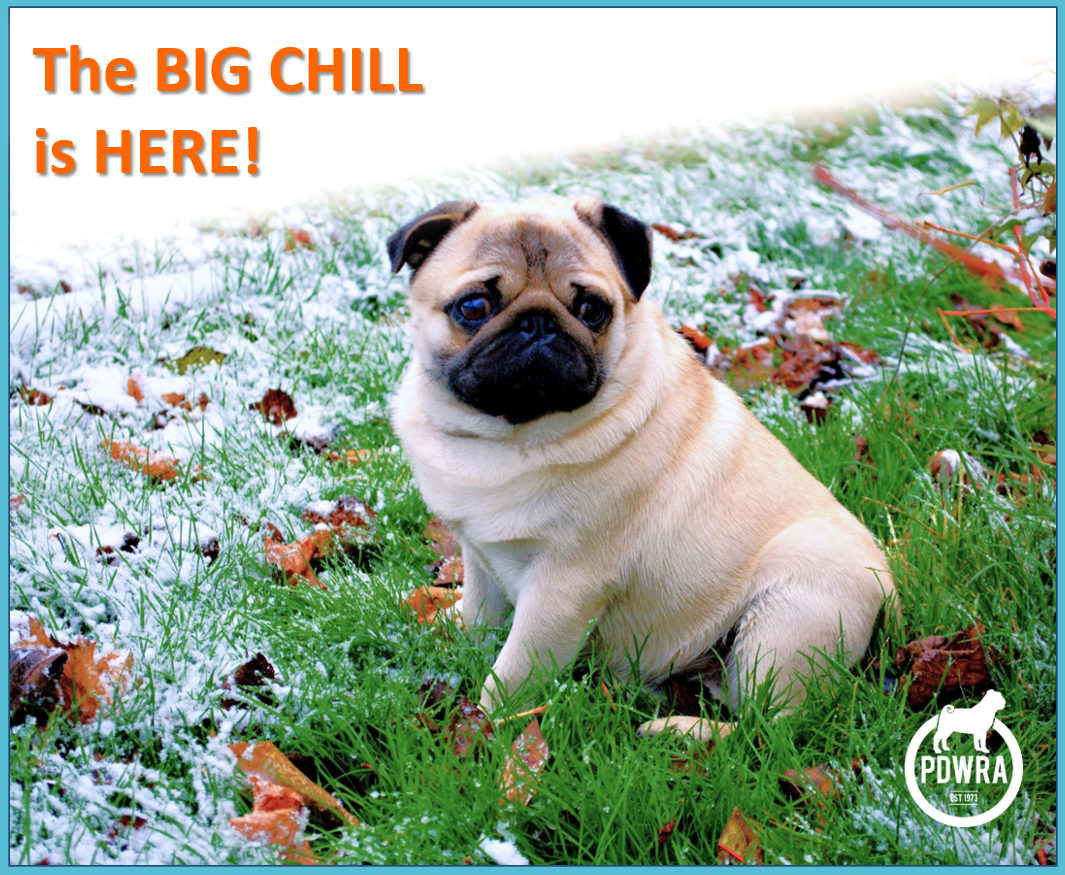
The Big Chill is definitely here! ❄️
We’ve been warned it was coming and temperatures have dropped considerately with widespread frost predicted.
Please see some useful guidance on when’s too cold, to take them out:
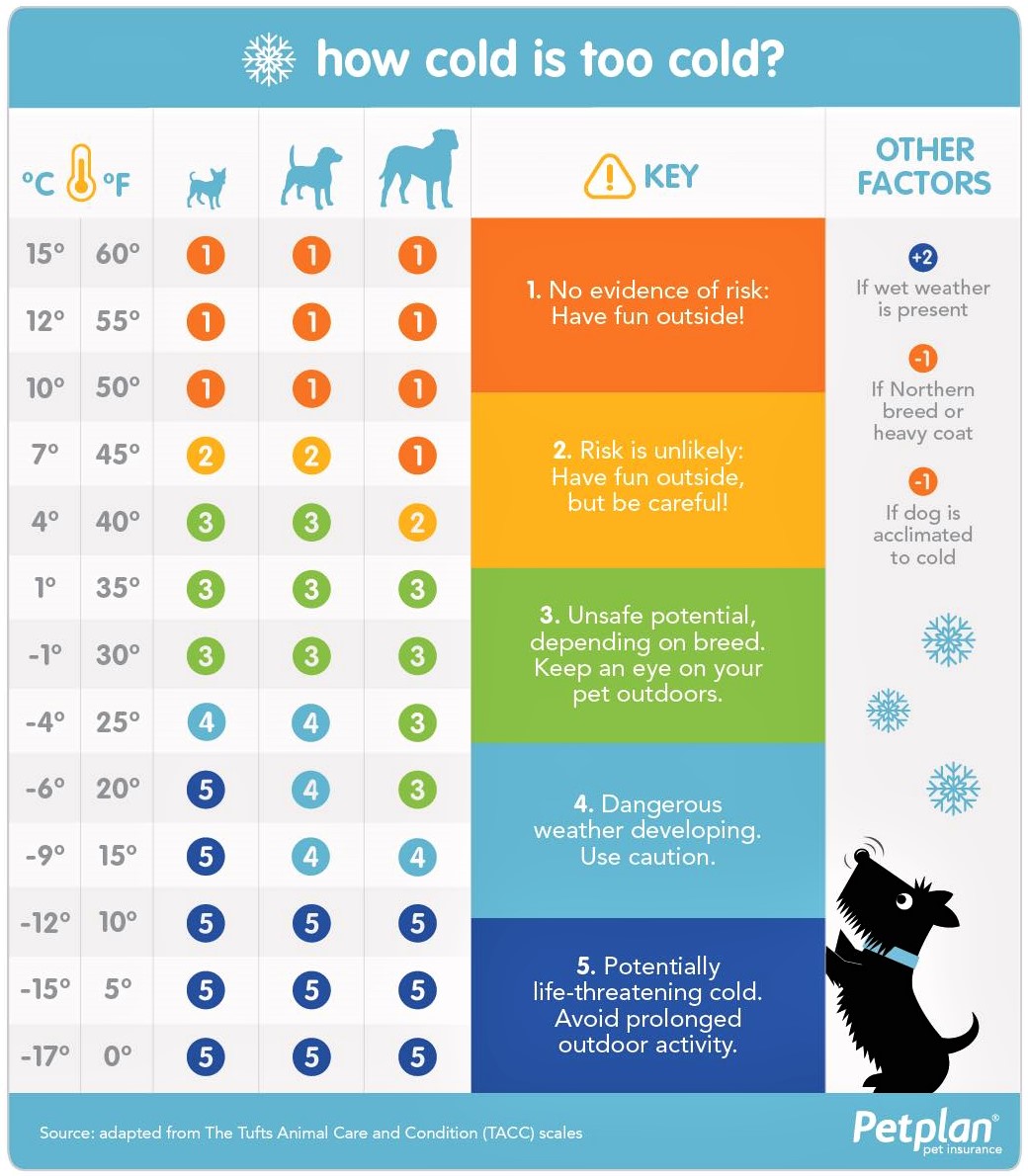
Here are some reminders to help your pug brave the cold if it’s not too hazardous to take them them out.
– Beware of thin ice.
– There will be more salted roads & paths where our pugs can burn their paw pads and it’s not always easy to tell where salt has been. Clean their paws including between their toes, once home to remove any potential residue.
– Take care when using antifreeze, remember others will be too. It tastes sweet, so is tempting for dogs but can be lethal if ingested.
– Watch for dogs drinking out of puddles too as they may be tainted with antifreeze chemicals.
Body-care:
– Do kit them out in warm outerwear, that fits well, not too loose or too tight to restrict their movement.
– Use winter paw protection if needed, this could be in the form of dog dry skin creams/ balms, or doggy booties.
– Inspect pug paws regularly to check for cracked pads, broken nails or snow/salt damage.
– Brush your pug’s coat regularly to distribute natural oils to the skin and prevent dry patches.
– If it’s windy, don’t forget to protect their eyes, either by extra lubrication gels and consider if on a beach, where sand can scratch them causing lasting damage without urgent treatment.
Margo & Alfie having a quick play in the snow.
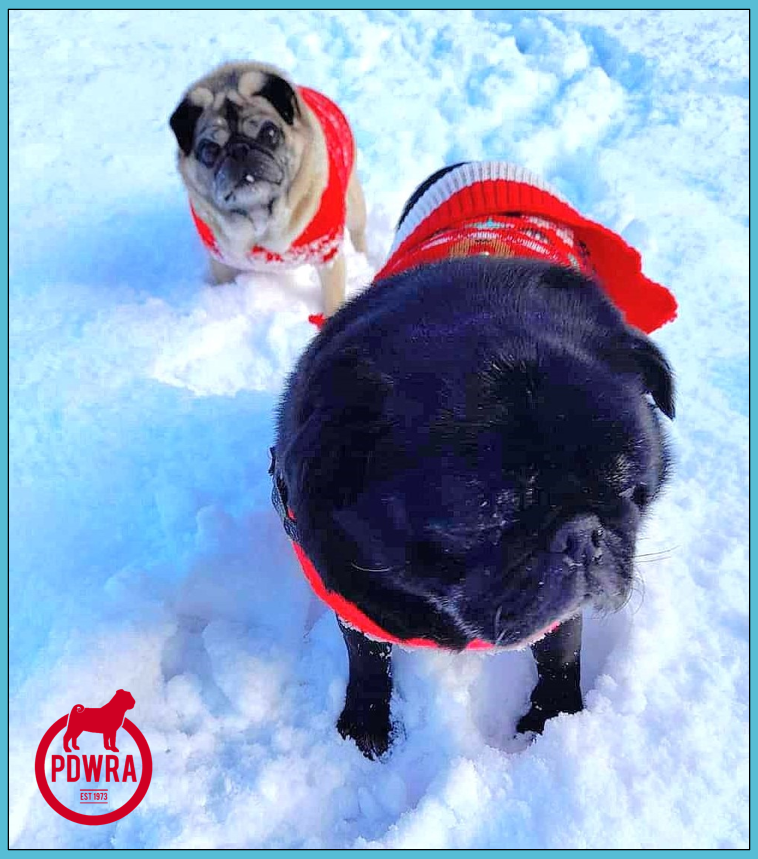
Keep your dog safe during winter | The Kennel Club
It’s Getting Cold Outside!! | The Pug Dog Welfare & Rescue Association (pugwelfare-rescue.org.uk)
Winter Tips for Outdoors! | The Pug Dog Welfare & Rescue Association (pugwelfare-rescue.org.uk)
Seasonal Hazards for Pugs | The Pug Dog Welfare & Rescue Association (pugwelfare-rescue.org.uk)
Have fun and play, while staying safe!
Margo says so!
